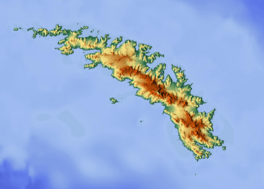Purvis Glacier facts for kids
Quick facts for kids Purvis Glacier |
|
|---|---|
| Location | South Georgia |
| Coordinates | 54°6′S 37°10′W / 54.100°S 37.167°W |
| Thickness | unknown |
| Terminus | Possession Bay |
| Status | unknown |
Purvis Glacier is a large river of ice located on the north coast of South Georgia. It flows generally towards the northeast, ending in Possession Bay. This glacier is a significant natural feature in a very cold and remote part of the world.
Contents
What is Purvis Glacier?
Purvis Glacier is a type of glacier, which is a huge, slow-moving mass of ice. It forms over many years from layers of snow that get packed down and turn into ice. This glacier moves down a valley, like a very slow-motion river.
Where is Purvis Glacier Located?
Purvis Glacier is found on South Georgia, which is an island in the southern Atlantic Ocean. South Georgia is part of the British overseas territory of South Georgia and the South Sandwich Islands. This area is known for its rugged mountains, glaciers, and amazing wildlife. The glacier flows into a place called Possession Bay.
How Purvis Glacier Got Its Name
The Purvis Glacier has an interesting history behind its name.
Early Exploration and Naming
The glacier was first mapped and studied by the German Antarctic Expedition. This expedition took place between 1911 and 1912. The team was led by a famous explorer named Wilhelm Filchner. When they first charted the glacier, they named it after John Murray-Gletscher.
Why the Name Changed
Later, the glacier's name was changed to Purvis Glacier. This change likely happened to avoid confusion with another glacier called Murray Glacier. That other glacier is located in a different part of Antarctica, in Victoria Land. The new name, Purvis Glacier, honors Petty Officer J. Purvis. He was a member of the Royal Navy, which is the United Kingdom's navy.
Why Glaciers Are Important
Glaciers like Purvis Glacier are very important for several reasons.
Natural Water Storage
Glaciers store a lot of the world's fresh water. When they melt slowly, they provide water to rivers and lakes. This water is important for plants, animals, and people.
Climate Change Indicators
Scientists study glaciers to understand climate change. When glaciers shrink or grow, it can tell us about changes in the Earth's temperature. The thickness of Purvis Glacier is currently unknown, but studying it could help us learn more about the climate in South Georgia.
 | Roy Wilkins |
 | John Lewis |
 | Linda Carol Brown |


